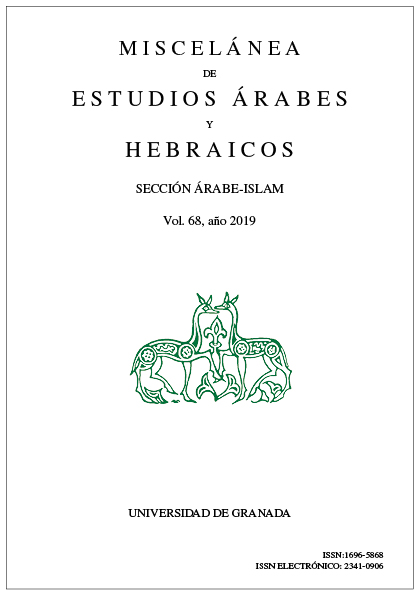A look at the Arabic grammarian Ibn Jinnī
DOI:
https://doi.org/10.30827/meaharabe.v68i0.977Keywords:
Historical linguistics, General linguistics, Arabic linguistics, Ibn JinnīAbstract
This paper looks at one of the most representative Arabic grammarians in the history of Arabic linguistics, the 10th century Iraqi grammarian Ibn Jinnī. One of the paper's aims is to contribute to the dissemination of Arabic linguistics studies, as a means of promoting their inclusion in general linguistics, since Arabic linguistics currently occupies only a marginal place in this field. As this paper shows, with the figure of Ibn Jinnī, the Arabic linguistics tradition has had important peaks, especially during the Middle Ages and more specifically starting in the 10th century, with the emergence of a series of linguistic ideas that today's scholars often find surprising, for their singularity and even their similarity to current linguistic paradigms. Ibn Jinnī is especially noteworthy because he applied logic to the linguistic fact, offering readers meticulous and detailed studies on a wide range of fields, such as the foundations of language, phonic and morphological analysis, and others, all of which he infused with his particular innovation and idiosyncracy.
Downloads
Downloads
Published
How to Cite
Issue
Section
License
The authors publishing their work in this journal agree to the following terms and conditions:
1. The authors retain the copyright and give the journal the right to be the first publication of the work and also to be licensee under a Creative Commons Attribution License which allows others to share the work, provided the author of the work and the initial publication in this journal are acknowledged.
2. Authors may make additional agreements separately for the non-exclusive distribution of the version of the work published in the journal (for example, putting it in an institutional repository or publishing it in a book), with acknowledgement of its initial publication in this journal.
3. Authors are allowed and encouraged to electronically disseminate (for example, in institutional repositories or on their own web page) the published version of their works (publisher's post-print version) or, if not possible, the author's reviewed and accepted post-print version. This is to facilitate productive exchanges, and allow for earlier and greater citation by third parties of the published works (See The Effect of Open Access).
4. The journal accepts no responsibility for the opinions expressed by the authors.















